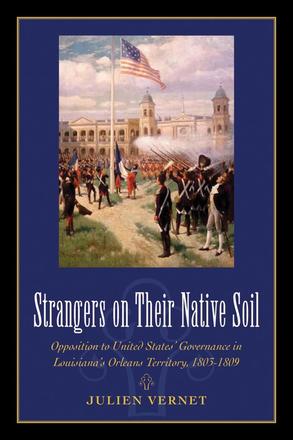
Strangers on Their Native Soil
Opposition to United States' Governance in Louisiana's Orleans Territory, 1803-1809
The story of America's early political division of Louisiana and the test posed to the new republic's revolutionary principles and westward expansion
Description
After the United States purchased Louisiana, many inhabitants of the new American territory believed that Louisiana would quickly be incorporated into the Union and that they would soon enjoy rights as citizens. In March of 1804, however, Congress passed the Act for the Organization of Orleans Territory, which divided Louisiana into two sections: Orleans Territory, which lay southwest of the Mississippi Territory; and the Louisiana District. Under this act, President Jefferson possessed the power to appoint the government of Orleans Territory and its thirteen-man legislative council. The act also prohibited importation of most slaves. Anxieties about their livelihoods and an unrepresentative government drove some Louisiana merchants and planters to organize protests. At first this group used petitions and newspaper editorials to demand revisions; later they pressed for reforms as a political faction within the territorial government.
Outside of Louisiana, the conflict became a harbinger for the obstacles to westward expansion and clashes ahead. American politicians became alarmed about the future of American governance, territorial expansion, and the growth of slavery, all issues raised by the Orleans protesters. John Quincy Adams, for example, worried that the government established for Louisianans violated the principles of the American Revolution. Federalist Fisher Ames believed that Jefferson's power over Louisiana would allow him to establish a western Republican empire ensuring the national demise of the Federalist Party. Slaveholders and supporters of slavery in the Congress attacked the restrictions on importation of slaves, using arguments in debates with opponents of slavery that were repeated until the outbreak of the Civil War. Because they caused politicians in the Congress to reconsider how people in areas acquired by the United States should be governed and because they reinvigorated the national discussion about the future of slavery in the United States, the Orleans protesters played a significant role in influencing the shape of American territorial expansion.